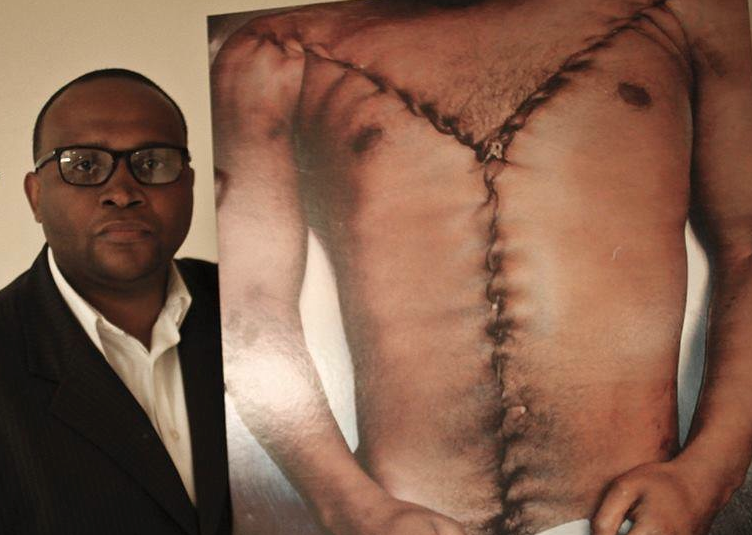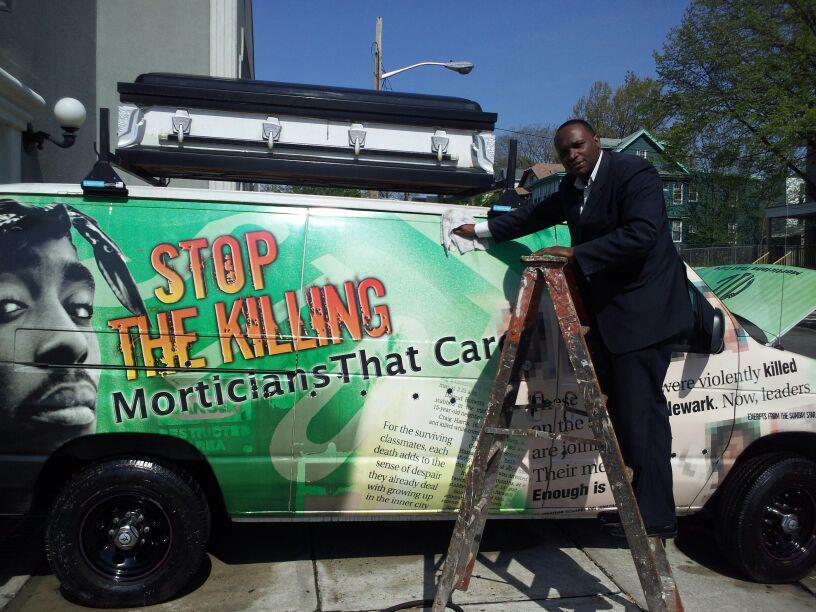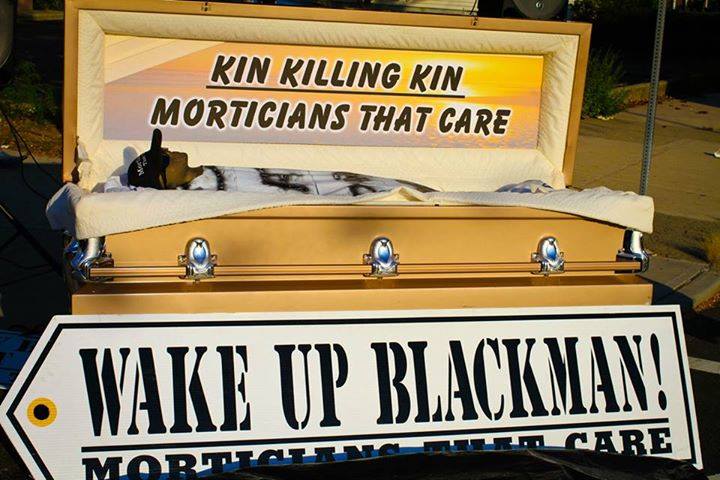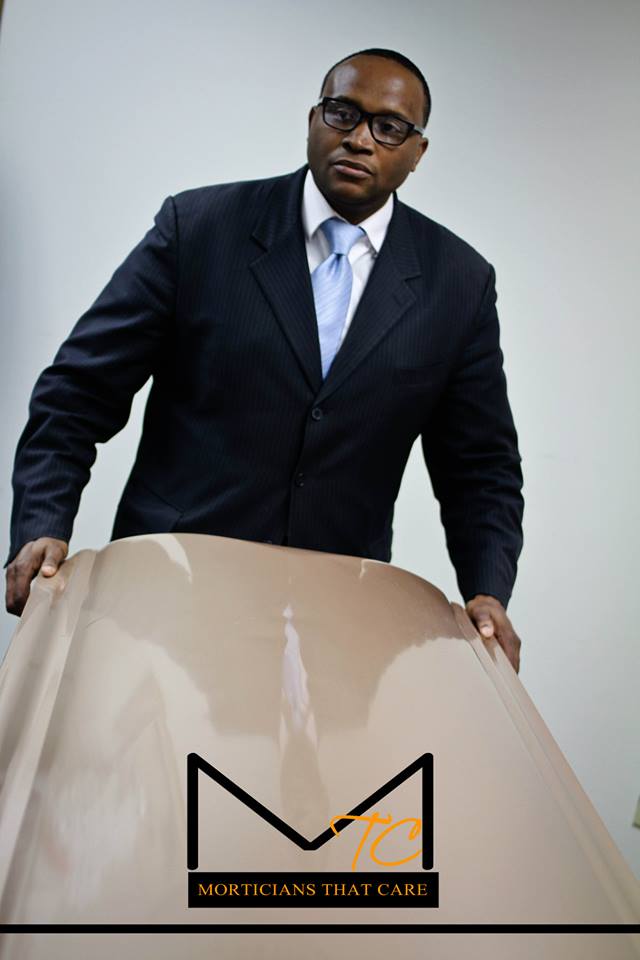 When Tyrone Muhammad recently wrote on his Facebook wall, “Tired of embalming so many young people it’s sickening. I wish you all could see my world,” he was commenting on something that most know frighteningly little about: the epidemic of homicide among black males under the age of 25.
When Tyrone Muhammad recently wrote on his Facebook wall, “Tired of embalming so many young people it’s sickening. I wish you all could see my world,” he was commenting on something that most know frighteningly little about: the epidemic of homicide among black males under the age of 25.
It is not easy to speak out about the tragedies in one’s own community, but it’s in this uneasiness that Morticians that Care thrives. Founded by Muhammad, also known as Muhammad the Mortician, as a reaction to the violent deaths he was responsible for handling as a funeral director in Newark, NJ, Morticians that Care is an anti-violence organization that confronts the mayhem of street life with its own aggressive tactics. Driving a van wrapped in a decal of Tupac and Biggie juxtaposed with a pair of toe-tagged feet and a casket mounted to its roof is one way to spark public engagement, but it’s Muhammad’s rhetoric that fires shots directly at the most impressionable. “Swag count for nothing when you lying in a casket,” Muhammad says in one of his videos attacking the corporate hip hop culture that has made millions off of glorifying gang banging. In another video, Muhammad bitterly cuts to the chase, “The reality of it is when I see you. When I see you, it’s over.”
Speaking with Muhammad over the phone, his intensity and commitment to changing the course of young people’s lives is no less evident as it is in his videos. We began our conversation with a discussion of this.
Watching a lot of your interviews and videos, the vocabulary that you use is really intense. I think in one of the videos you get very real, talking about watching ‘blood run down a cold metal table’. How do you find that people react when you speak that way about this situation?
It’s definitely effective, because I’m giving them an inside picture of what goes on. People typically come to see [the dead] laying in a peaceful kind of state, so I try to give them what it is behind the scenes at the funeral home, the incisions; the viscera is in one place and blood is running down the table, so its graphic in nature and it gets the people’s attention 100%.
How do you think that the fantasy of a funeral has played into this lie about what death really is- is it keeping a disconnect in the community?
Most people have a warped mentality. They play video games or whatever and they shoot a person and that person gets up. Or it’s set in a TV fantasy land. I think that could be a part of it.
At the end of the day they think its kinda cool. This sounds crazy to think you wanna see how many people is gonna come to your funeral, but the deceased isn’t gonna realize that they’re no longer present-they can’t tell. But it seems like that’s the new cool fad. The funeral is a place of mourning-but it’s not. It’s a place where a bunch of young people get together and kinda,-how do I say-celebrate, but the celebration is not…it’s like cool; it’s like a passage to manhood, for lack of a better word.
We have to be so careful. Yeah-its celebration of life, but let’s not gets carried away-this is not something to celebrate.
That is correct I agree with you.
You also speak a lot about the affordability of funerals. You make an interesting point that people don’t always consider-especially young people-that it puts a hardship on families when they have to come up with money to have a funeral.
Absolutely. I mean you need to understand, the community that we serve or the funeral home serves-we have three funeral homes- we have a funeral home in a middle class section where the price is just affordable most of the time. At the funeral home that I am at, we service people in the lower income.
So for a lot of people that’s getting murdered, the mothers just don’t have the money. Most of the time it is the mother that’s present. The father may be present, but it’s the mother-the suffering, poor mother-who was working two or three jobs to provide for a child. They don’t have that much money to pay they bills as it is, you know? It’s the rent, utilities bills, etc. and now you asking them to come up with five or six thousand dollars in the four or five days.
I don’t think these young people have a clue in the hardship that they parents is gonna endure. Because I always tell ‘em when I’m speaking to them- I tell ‘em that you know that if your mother is kinda on the borderline of being an alcoholic-some will say they mother’s kinda do drugs or kinda drink-but she’s on the border line. By if your life is being taken or your taking someone else’s life? It’s not just gonna affect your life, it’s gonna affect your loved ones.
The choices that you make doesn’t really lie directly on you; it has a great impact on other people. The state of New Jersey will give four or five thousand dollars to help them out with the Victims of Crimes Compensation Office. If it really weren’t for that agency, a lot of these families wouldn’t have no one to bury their children. Their friends don’t help ‘em out at all.
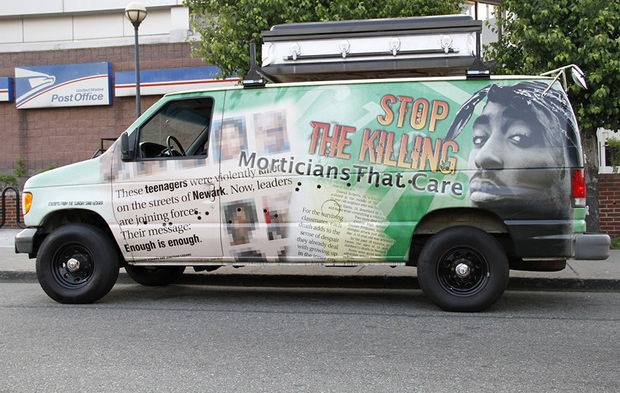 You’ve been frustrated with other funeral professionals for not stepping forward. Have you seen any change in that since you’ve started?
You’ve been frustrated with other funeral professionals for not stepping forward. Have you seen any change in that since you’ve started?
Well, no. But you gotta understand the beautiful thing about it- the way God has put it right now for me is I’m able to get an insight into what people are doing around the country. Look at the videos, Facebook, YouTube; hundreds and thousands of people are getting to hear you 24 hrs/7days a week. That’s the beauty, because so many people got a story to tell.
But the funeral homes in my area…they’re terrible. They not doing anything. They may come out for one big rally or something like that, but for the most part its real sad. It’s sad, disgusting. Because I have to say if this had gone on in any other ethnic community it would be a more… it would be an outrage.
Unfortunately, young black people being killed appears to be a big part of your business, is that true?
Yeah, it’s a contributing part of it absolutely. If you say that you get 150 victims, 150 to 200 murders right in your county-and we have three major funeral homes in my city that pretty much everyone goes to-so you gotta figure, I mean we’re profiting really good off of every one of them and also its a form of advertisement, too. Because you know the better you can patch up a bullet hole the more people wanna come to you.
You hear ‘em at the casket saying ‘Wow! Where- where’d he get shot at?!’
[The bullet wound] is right there but we in the business know that the cold cream, wax, hot heat maybe a little bit to smooth it out, put the makeup on top of it- looks very nice. But they be like, ‘Wow, man that’s where I wanna come when I get shot!’
I mean you hear young people talking like that, you know? So yes, there’s a lot of violence that takes place here.
When I look at the people who sit here and talk to me, I mean this violence is going on in so many other urban communities, it’s staggering. As a funeral director, I come from behind the scenes. I blast on the scene because you can just sit there and get fed up or you start the conversation and dialogue.
It’s a tough position to be in. Do you feel like people look at you like a hypocrite because you’re getting paid? How do you respond to that?
Well, people that know me know I’m not a hypocrite, but they can say that funeral homes are hypocritical. What made me became a mortician was another mortician was very hypocritical when I was burying my mother. But I mean, they know I’m real. We have funerals at our funeral home or church. When it’s time for remarks I’ll go up and talk.
I deal real with ‘em. I present them with actual facts. I tell ‘em we don’t want these type of deaths, I don’t care anything about your money, I’m just here to tell you the truth, let’s cut the violence down.
Now, the word hypocrite can apply to the funeral director because they’re supposed to comfort you, console you and care about you but bottom line- if you don’t have the money, well then they care nothing really about you. That’s what I’m seeing in this profession. They don’t care anything about these people who have passed on violently if they don’t have that money. But if they have that money, they treat ‘em like royalty.
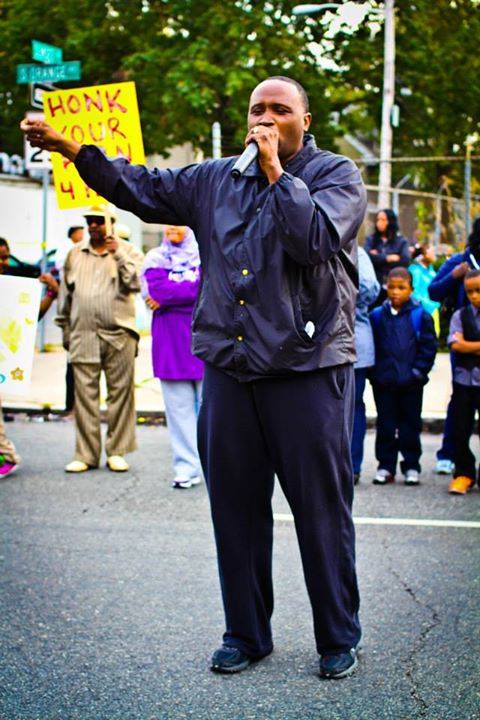 Maybe another reason we don’t see funeral professionals get socially or politically active is because they don’t want to lose customers?
Maybe another reason we don’t see funeral professionals get socially or politically active is because they don’t want to lose customers?
Yes, it is a business and certainly we’re in business for profit. We’re in business to make money, we all know that everyone has to pass away, but we don’t want these types of death. We don’t want so many deaths of our young men.
Me in particular, being a black man, we see so many black young men come into our funeral home butchered and gutted; brain, organs- all of that are gone. Well, it’s in the garbage bag or plastic bag put back in your stomach. We can’t just look at death as death- it’s very profitable all the way around because a lot of people are profiting from the deaths of young black men. And it’s tragic that we have a lot of people that have a voice on national scale that could try to bring a dialogue to this but they’re doing nothing.
We need the black funeral directors, black morticians to take effect on it. So I mean, we can’t expect the white community, we can’t expect other communities, to speak out on this. They should, but it’s our obligation to speak out on it as black people.
Do you think that they don’t want to be associated with such a violent outcome of their people?
Well from a funeral director, listen-they’re desensitized. They don’t have feelings one way or another. If you’re not emotionally attached to your cause, to your purpose, your passion…my passion is that I love my community; I love my history. I love our legacy, I’m a voracious reader, I study up on the past of who we were and who we are and to see that being destroyed by us and seeing people in the same capacity that I’m in, particularly as a funeral director, we see people-our people-at their lowest point.
You not speaking out on it, you desensitized. You don’t care nothing about it. My colleagues say I’m too caught up in it, they say ‘listen-this is business, man’. See what I’m saying? But [other black funeral directors] don’t understand the great impact that they have.
It’s been almost ten years since your started your mission. What are some positive things you can point to as effective?
Throughout the years, I was just staying in North New Jersey. Now we got the van with the casket mounted on top. I can’t tell you the schools and the mothers… I think that’s the fuel that I need because they see me out there, they see us out there for years, they come and say, ‘Mr. Muhammad, my son saw you out there with the casket. You were talking and it really hit home for them.’ And as of lately, with the posting of these videos and Facebook and it just went viral, I really get that even more.
People’s lives have been saved. In fact, just six days ago they were having a men’s service and one man’s brother was murdered and he wanted to go and retaliate, but he could never find the guy. But then I showed my video, “The Aftermath of Being about That Life”, he said, “Man, after I watch that video…” the young man- he forgave the man and he gave his life to Christ. So listen, that right there alone lets me know man, that’s what it’s about right there. And I know it wasn’t just that one, what I do affects hundreds of people I may not even know about. I’m getting text messages, emails, 24 hours a day. They telling me the tremendous impact that I’m doing. So everything is just like dropping a little pebble in the water and how it’s creating a big waterfall further down.
Do you have a schedule of when you do your mission work?
We have an organization here called Newark Anti Violence Coalition that goes out every Wednesday. I try to go out with them as much as I can. But for me personally, when the weather breaks, like this month or next month coming up, I’m in the field all the time. But now with the video- we got a video camera on board now- like tonight, I was on the video tape just sitting at my house just talking about funeral directors, really. I was really gonna go hard at the funeral directors tonight and put it on YouTube.
But I think this year actually is going to be a really, really powerful year for Mohammed the Mortician, that’s the brand and Morticians That Care, the organization. It’s going to be a powerful year because the videos have been viral and the people are responding. The people want me there. I gotta go to Baltimore, MD and that’s in May. I gotta go to Patterson. I mean I’m always speaking somewhere. I gotta speak at a church. North Carolina. Arkansas wants me. California. Florida. I mean they want me everywhere. See what I’m saying? It’s not about me- it’s really the message. Someone had to stand up and it just so happened to be a funeral director so everyone is jumping on board.
They didn’t care who stood up but someone is standing up, speaking up and trying to keep our babies out of the casket. That’s our whole goal: to keep our young people out of the casket. So I gotta do what I gotta do to keep our young people out of the casket.
So if I gotta show-with the permission of a family-[a body] with the head, with the skull open? When you looking inside the circle of Willis, with the brain removed, giving you shock value, showing you the Y-incision, and what it look like open up with the viscera and the viscera removed? Yeah, I’m gonna do what I gotta do, because right now that’s the state of urgency that we’re in. That’s where we’re at right now.
There is a lot to think about within funeral service. There are all these ‘issues’ that get raised. When I read articles about the funeral industry or funeral homes it’s always about personalization or the aging population, but then I read profiles of funeral homes dealing with the epidemic of the young people-it’s such a stark contrast of what the real issues are. I wonder, as a funeral professional, what we can do to think about that.
Well, that’s a very good question and to answer this question-sometimes to answer it could be kind of, I don’t know, very sensitive. It may hurt some feelings because we’re really dealing with race in a sense. White funerals with aging, that’s a normal process, that’s no issue. Young black men are being murdered, I personally think it’s a conspiracy to destroy black men, black young males in particular and this has been going on for years and it has been perfected now.
This is a deeper issue. Black on black violence is a real deep issue. Because if you deal with that, you’re gonna have to deal with some uncomfortable talk and that’s gonna be dealing with race talk. That’s my honest opinion.

